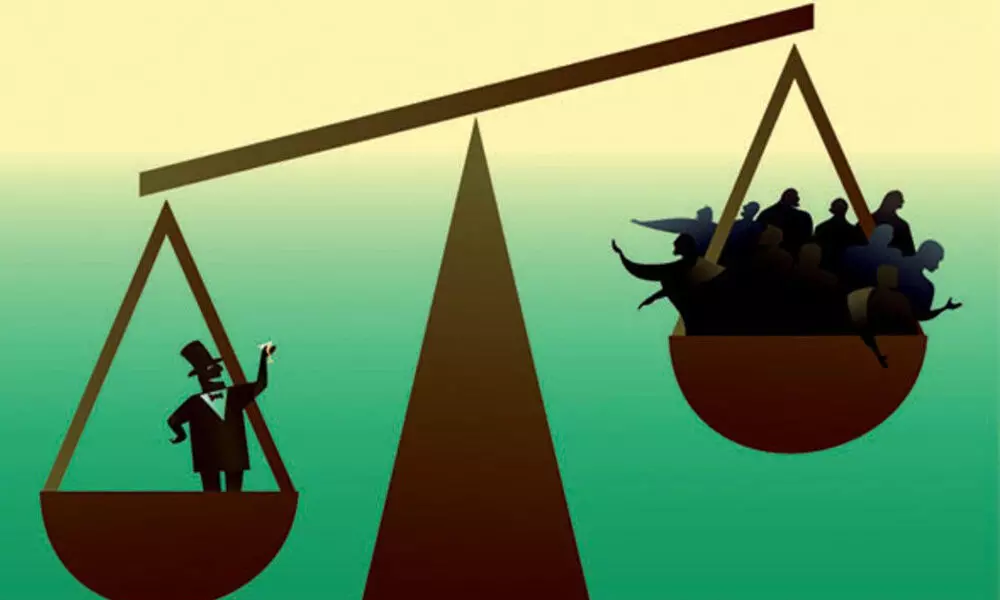Disparity in development is all-too pervasive

Disparity in development is all-too pervasive
Another dimension in which injustice and inequality, sometimes leading to persecution, can perpetuate themselves is neglecting or ignoring the interests of people belonging to a race, community or subscribing to a religious faith, by those dominating the instruments of political and administrative control
Another dimension in which injustice and inequality, sometimes leading to persecution, can perpetuate themselves is neglecting or ignoring the interests of people belonging to a race, community or subscribing to a religious faith, by those dominating the instruments of political and administrative control. History is replete with such instances.
While, in some cases, it stopped with neglect, it also took the shape of persecution in many cases. And, strangely enough, the perpetrator at one place and time, turned the victim at others. The Jews, the Christians the Hindus and the Muslims have all, from time to time, been either one or the other at various times in history.
The history of anti-Semitism, defined as hostile actions, or discrimination, against the Jews as a religious or ethnic group, goes back many centuries, with anti-Semitism being called "the longest hatred". It is a phenomenon that goes back a long way into past history. Pre-Christian anti- Judaism, in ancient Greece and Rome, was primarily ethnic in nature, Christian anti–Semitism, in the Middle Ages, was religious in nature, and extended into modern times. Muslim anti-Semitism arose from a perception that the Jews were a protected class. And the racial anti-Semitism which arose in the 19th century finally led to Hitler's Nazism leading to the Second World War.
Christians have been the victims of similar treatment from as long ago as the 1st century BCE. Missionaries and converts were, targeted in particular. Christians belonging to one sect were also persecuted, on account of the perception that the doctrine they subscribed to was characterised as heresy.
Hindus have suffered discrimination, sometimes leading even to a violent and cruel manifestation, at the hands of the Muslim rulers as well as the colonial rulers from Europe, primary the British. In more recent times, especially after independence, Hindus, a minority in Pakistan, have been subjected to discrimination and ill-treatment, which has also spread, sporadically, to different parts of the world.
There have been several instances of religious violence against Muslims since the Partition of India in 1947, frequently in the form of violent attacks especially post the 9/11 attack on the Twin Towers in New York City.
Several countries in the world have undertaken programmes and projects to create access to basic human needs, opportunities of employment, and educational facilities, largely in order to compensate for the adverse impact of discrimination suffered by certain sections of Society over long periods in the past. The constitutional safeguards providing for reservations in India is a significant example. It is different matter that such interventions can sometimes be overdone and create a counter-productive sentiment.
Somewhat similar are the safeguards provided by the Constitution makers as well as the development programmes and welfare measures undertaken by central and State governments for mainstreaming the scheduled tribes, mostly living in the hilly and forested areas of the country.
Here, again, social scientists as well as environmentalists have viewed with distrust, and suspicion, the benefits of the intervention when weighed against the damage to the culture of the people and the natural resources that natural habitats are endowed with. It has also been argued that' happiness' is a state of being which is much more than merely provision of basic requirements, good education, remunerative employment and health/medical care.
The unacceptability of the degree of disparity, between the higher echelons of society and those at the lower rungs, can be seen by the fact that the world's richest one percent own 44 percent of the wealth which, estimates show, increases by $2.5 billion every day. A new billionaire is also created every two days. Just contrast this with the fact that more than half the population of the world subsists on an income of less than $5.5 per day. And a child under 15 dies every five seconds mainly on account of malnutrition.
All efforts to address these divisive cleavages have, so far, succeeded only in leaving a considerable residual agenda which includes battling the 'five giants' described by Lord Beveridge, namely want, disease, ignorance, squalor and idleness. Another concern needing to be addressed is the fact that women, generally, are given a raw deal in the process of development and growth, almost everywhere in the world, earning, as they do, much less than men do.
Governments around the world need to understand, and appreciate, the importance of immediate and purposeful steps towards the goal of building a new and humane dispensation, in terms of social, political and economic values that truly matter to society, rather than standing by those driven only by motives of profit or self-interest.
In the process of addressing this concern, two seemingly contradictory forces normally emerge, namely, the sustainability of the process of growth and development, and the compelling need for ensuring social justice. Proponents of sustainability frequently emphasise the importance of adding social justice to the effort, while social justice advocates are emphasising, increasingly, on the incorporation of the ideas of sustainability into their own agendas.
Clearly the time has come for the situation to change; and to change dramatically. Not only have the social economic and political inequalities to be put an end to, but also, the effort aimed at achieving that objective has to be inclusive and gender-sensitive, while the benefits are made available evenly over all regions and classes of people. Programmes and projects aimed at social justice and welfare should be undertaken side by side with the process of social transformation and development gaining strength and becoming self-sustaining through a system of integrated and inclusive governance.
What India needs is a revolution in which all stakeholders, including the central and state governments, civil society based organisations, non-governmental organisations and individuals, perform their duty towards fulfilment of the Constitution-makers' dreams of ensuring an ethos of economic and political justice to all citizens.
So far as women are concerned, for example, what is needed is the putting in place of an environment that promotes and protects, the rights of women. The effort should include the passage of a Uniform Civil Code to provide equal rights in divorce, inheritance across all religions, entry into temples etc.
Mankind needs to be able confidently look forward to a world that values the individual, and appreciates the importance of putting in place an environment that enables human beings to live in comfort, happiness and with a sense of security. A world, in other words, that promotes, and supports, effort aimed at justice, equity and the welfare of its members – a realm that works for everyone and not just the fortunate few.
The alternative is to reconcile to humanity facing a future where economies are irreparably damaged, and Society is irretrievably torn apart by the hiatus between different sections.
As the war currently being waged against the unprecedented Covid – 19 virus is beginning to show signs of success, we must not forget that there are many other threats to the continued well-being of mankind, and the sustained growth and development of the world's economy. Phenomena such as climate change, terrorism, food and nutritional in security are only some of them. We can, however, derive solace from the fact that the human race, has, in its history, faced, and overcome, many such threats.
Given consensual effort by the countries of the world, and the creation of an atmosphere of cooperation and mutual goodwill, one feels confident that the billions that inhabit this wonderful planet can look forward to a future that will be safe, comfortable and happy. It is in that situation that the important question, namely, whether the benefits of future developments will be shared equitably and justly, can be answered in the affirmative.
(The writer is former Chief Secretary, Government of Andhra Pradesh)














